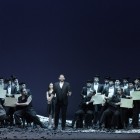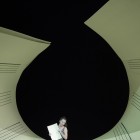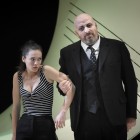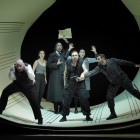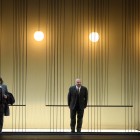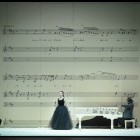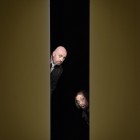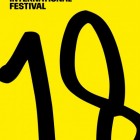Barbiere di Siviglia 2018Théâtre des Champs-Elysées, Paris
Read more about the opera Barber of Seville
The operatic offering at the 2018 Edinburgh International Festival consisted of three fully staged productions imported from leading French companies. There were also two concert performances.
In recent years we have heard several of Rossini's less frequently performed operas. Now we could see, together for the first time here, his two most popular comic masterpieces. Il barbiere di Siviglia was presented by Le Théâtre des Champs-Elysées, on their first visit from Paris and La cenerentola by the familiar and welcome Opéra de Lyon.
In addition, John Gay's Beggar's Opera was performed by the Théâtre des Bouffes du Nord, from Paris, who had a substantial residency at the Festival, with two more dramatic works. William Christie led the musical side of this multinational coproduction.
The third instalment of Wagner's Ring, Siegfried was performed in the Usher Hall. Sir Mark Elder conducted the Hallé; the all-star cast included Simon O'Neill (Siegfried), Christine Goerke (Brünnhilde) and Iain Paterson (Wanderer).
The creepy forest theme continued with a concert performance of Humperdinck's Hansel and Gretel, given by the RSNO under Sir Andrew Davis. Elizabeth DeShong (Hansel) and Laura Wilde (Gretel) led the cast.
Two important oratorios were also given in the Usher Hall. The Dunedin Consort performed Handel's mighty Samson and the Festival's opening concert was Haydn's Creation.
Conductor Jérémie Rhorer led a thoroughly musical interpretation of Così fan tutte a couple of seasons ago. His Barber was an equally light-fingered and musically authentic account of a familiar piece which has not been performed here for several years. The style was clear from the start of a fizzing overture - lively thwacks from the percussion and a richer, deeper string tone than usual, but with minimal vibrato. Also no shrillness from the higher instruments - flutes can sometimes get irritatingly over-excited in climaxes to this opera, but that was never a problem here.
Laurent Pelly's work has not been seen in Scotland before. However his stagings have been given to pleasing effect at the Royal Opera House and Glyndebourne as well as the New York Met. He generally acts as his own designer, and this vibrant production, originally seen at Paris's Théâtre des Champs-Elysées, provided a highly stylish picture, with huge curved sheets of manuscript paper, on which Figaro occasionally filled in the notes. The stave lines, turned vertically, could also symbolise prison bars or a cage for Rosina - just briefly, and not overdone. Costumes were basically modern. Rosina's formal flounced skirt was quickly removed, only to re-appear for the lesson scene. Figaro had fashionable tattoos on his arms and made his first appearance strapped in a chair lowered from the flies. He repeated this trick for his entry as deus ex machina in the Act 1 Finale.
If this appearance promised an untraditional interpretation, the surprise was just how faithfully Pelly followed the normal manoeuvres. It was all meticulously drilled, with the chorus (modern Spanish police) actions carefully co-ordinated. In some ways it was reminiscent of the work of a great director of the past whose work (including two classic Rossini stagings) was frequently seen in Edinburgh, Jean-Pierre Ponnelle - though that director generally stuck to period. If there was one thing missing, it was perhaps a fault of the opera itself, that it lacks humanity and can be just too mechanical, a claim that could never be made of La cenerentola, which could be seen at the end of the Festival.
Most of the singers were unfamiliar in Scotland. Rosina was a young French mezzo, Catherine Trottmann, a nimble actor, who injected plenty of character into her part. If there was one shortcoming in her vocal performance it was perhaps the absence of the smooth contralto lower notes of the ideal Rossini mezzo. The Figaro, Guillaume Andrieux, was a livewire performer, as anyone in this role must be. However he didn't dominate proceedings as most of the baritones who tackle this part tend to do.
Almaviva was played by a young American tenor, Michele Angelini, a noted Rossini specialist. Reviews suggest that on opening night he was off-form, but for the second performance he was restored to vocal health. The voice may not have the beautifully sweet tone of the ideal Rossini tenor, but it combines the fabulous coloratura technique with rather more power than usual. His final celebration aria, 'Cessa di più resistere' was a real showstopper. He also had the natural sense of comic timing required for this role. He also projected a suitable element of charm.
The two basses singing Bartolo (Peter Kálmán) and Basilio (Robert Gleadow) appeared at previous Festivals in rather more serious bel canto roles. Given that cue, Bartolo was a more serious character than usual, not just a tetchy buffoon, but someone with a bit of a mean streak. Ideally he would have had crisper consonants to spit out the rapid climax to 'A un dottor'. Basilio's interpretation really seemed quite traditional in this context, and none the worse for that, with a lugubrious appearance reminiscent of Fagin from Oliver!. Julie Pasturaud's brief aria di sorbetto was briskly despatched, while the Fiorello and Ambrogio were distinct characters. Officer and Notary were played by unidentified choristers.
In all, while not the hoped for classic staging, this was a generally successful and highly enjoyable enterprise, well worth bringing to the Festival, and the audience lapped it up.
Performance Cast
- Fiorello servant of the Count
- Count Almaviva a young nobleman
- Figaro a barber
- Rosina Bartolo's ward
- Bartolo a doctor, Rosina's guardian
- Don Basilio a singing teacher
- Ambrogio Bartolo's servant
- Berta Bartolo's housekeeper

